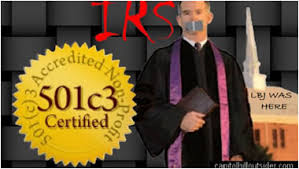 Pursuant to President Trump’s executive order on the notorious Johnson Amendment, my Dad put me onto an article in the National Review, recounting the limitations of this well-intentioned action of the Commander-in-Chief. The author makes a good case that personal executive orders cannot stand against the full force of entrenched law, which is where the real battle should be.
Pursuant to President Trump’s executive order on the notorious Johnson Amendment, my Dad put me onto an article in the National Review, recounting the limitations of this well-intentioned action of the Commander-in-Chief. The author makes a good case that personal executive orders cannot stand against the full force of entrenched law, which is where the real battle should be.
The answer to the Johnson Amendment, however, is to either repeal the statute or overturn it in court.
After all, any executive order can be easily remanded not only by a contrary-minded judge, as we seen happen twice now with Trump’s other executive order on immigration, but also by a future president. As the author reasonably argues, those charities, particularly churches and schools, who now violate the Johnson amendment, and oppose specific candidates for public office, are leaving themselves hanging in the wind, vulnerable to future prosecution by the IRS under a future presidential administration.
a later administration can tear up Trump’s order and begin vigorous enforcement based on actions undertaken during the Trump administration.
There are a few things to ponder here:
First, freedom should be one of the fundamental principles governing Church-State relations. The government should in the main leave its citizens well enough alone, so they can work out their own opinions and ideas, whether in or out of churches and schools, according to their own mind and conscience. Using ‘tax breaks’ as a cudgel with which to coerce people is a bad and oppressive idea.
Second, if we were taxed within reasonable limits (which would mean far less than we now are, especially here in Canada), no one would give much of a tinker’s dam about tax breaks.
Third, laws should be few and far between, reserved only for the most grave of matters, especially the far-reaching federal and state/provincial law. Saint Thomas states that laws should only forbid those things that are to the ‘harm of others’, without which society could not function (cf., I-II, q.96, a.2). These laws, furthermore, should be framed by wise men, who ponder over a long period of time, and they should be revised the same way. To govern a country by judicial or even presidential fiat, as necessary as this may be in emergencies, is haphazard, chaotic, even anarchic, and leads to bad laws and policies. Judges are not supposed to make law, but only determine whether and how an already existing law has been violated. Neither should the executive branch, of which the President is the head, make or break laws; they are tasked with enforcing the law, not writing it.
I wish Trump all the best in his desire to destroy the Johnson amendment, and wish also that we had some version of Trump here with the same desire. However, even if he were successful, which would mean overturning the law itself, there are far more fundamental problems in America than the Johnson amendment, and the mere fact that this legislative over-reach was permitted back in 1959, so that Lyndon Johnson could muzzle his opposing candidate, itself speaks volumes. America is drifting further afield from its constitutional foundation, and it may be a long and painful journey back to sanity and just rule.
But I agree with Anthony Esolen and others, that the deeper problem in both America and Canada, indeed throughout the world, is cultural and religious, involving the notions of family, hearth and home, civic and moral duty, honour, and our very view of life, the universe and eternity.
Unless there is some common consensus on these fundamental principles through a shared culture, and to some extent a shared religion, seeking a political remedy through laws and orders is a quixotic venture, which may at best offer us a temporary reprieve from sliding further into anarchy.
